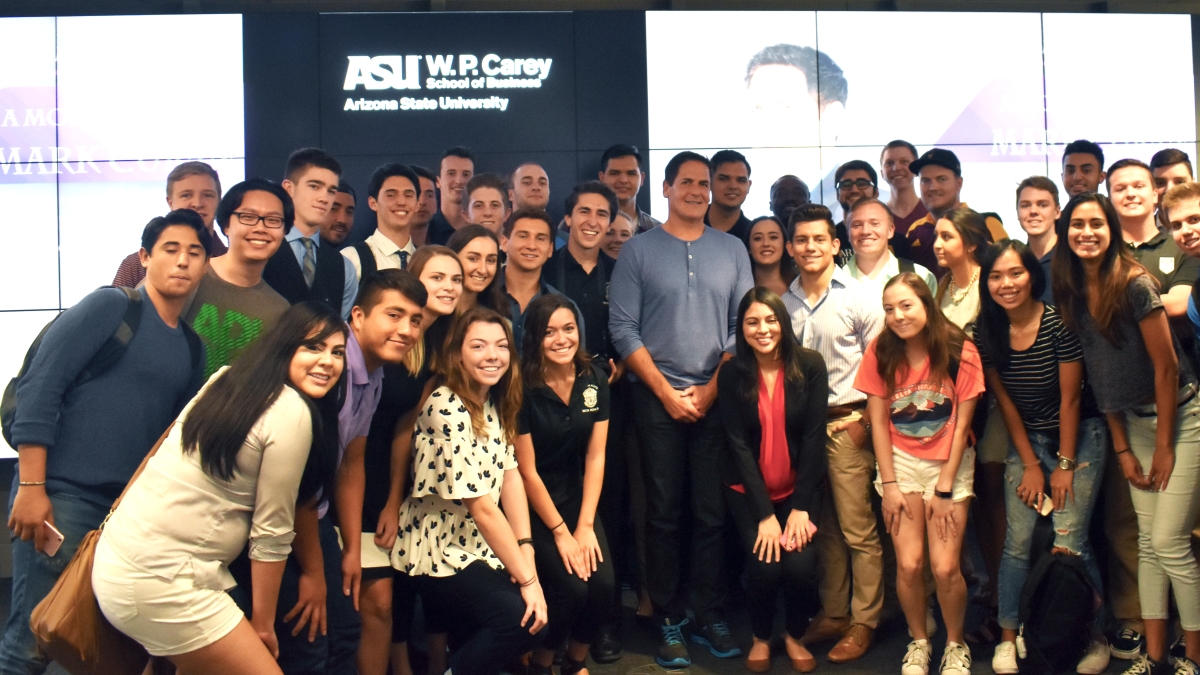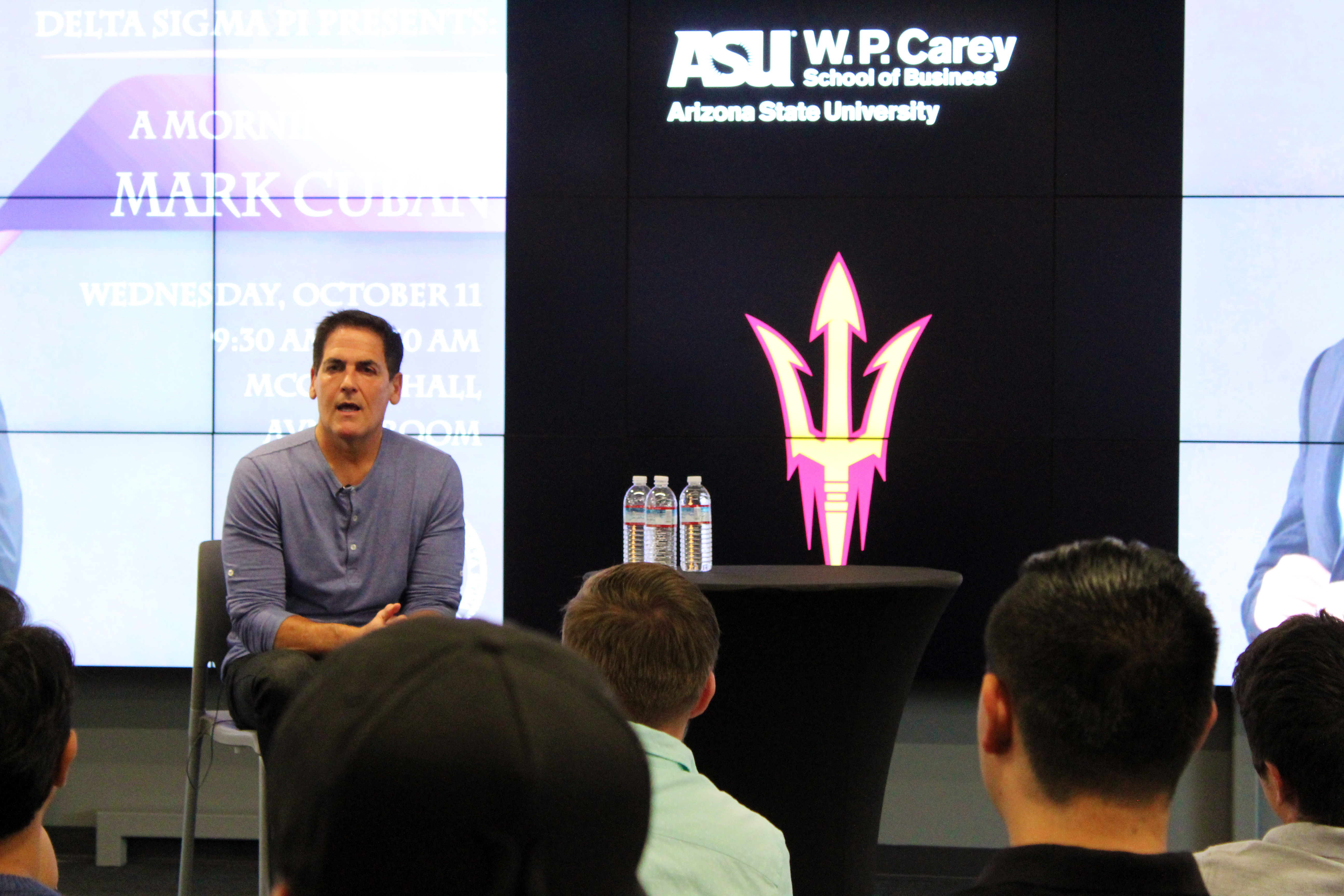Editor's note: This story is being highlighted in ASU Now's year in review. To read more top stories from 2017, click here.
Many ASU students with big dreams aspire to be like a successful leader or to follow in the footsteps of a famous person.
Billionaire entrepreneur Mark Cuban wants them to aspire to be themselves.
“I don’t try to sit up here and say ‘aspire to be me,’” Cuban, the owner of the NBA’s Dallas Mavericks and the host of ABC’s “Shark Tank,” said during a presentation at ASU's W. P. Carey School of Business Wednesday. “You’re here for a reason. You’re here because there’s something you want to accomplish. There’s something in your head. There’s something in your heart. There’s something inside of you that you’re excited about.
“This is your chance to be excited.”
Cuban, who visited Arizona State University at the invitation of the Delta Sigma Pi business fraternity (of which he was a member at his alma mater, Indiana University), told students he wasn’t sure what direction his career would go, but he knew he wanted to be in business.
“One of the advantages I’ve always had is I understand the language of business,” he said. “When people spoke about accounting, I understood it ... I understood marketing, I understood sales, I could walk into any company and know what was going on when they spoke to me about what they were trying to accomplish.”
Cuban, who briefly owned a bar after graduating college and has started many companies since then, encouraged his audience to be entrepreneurial and said the most important person in an enterprise is most often the founder.
“There is nobody more responsible for the sales in the company than the entrepreneur who started it,” he said. “You can’t be dependent on somebody else.”
And he praised the commitment of the students who joined the business fraternity not only for their dedication to their studies, but for absorbing all that they can outside the classroom as well.
“By being part of Delta Sigma Pi, being part of business school, learning about business — not just in classes, but outside of class as well with things like this and things you consume and read on your own — that’s how you give yourself a leg up.”
Mark Cuban address students at ASU's W. P. Carey School of Business on Oct. 11. Photo by Sebastian Martinez-Pagan
Besides being an American businessman, investor and TV personality, Cuban authored the book, “How to Win at the Sport of Business, “because business is the ultimate sport” he said.
“When I start a company, I’m going to be competing against one of you, and you better hope you’re not competing against me,” he said.
That competitiveness is one of the things, Cuban said, that has kept him engaged in business to this day, because there’s always a way to improve and there’s always a way to get smarter about what you’re doing.
Cuban’s appearance at ASU came about rather abruptly.
W. P. Carey School of Business student and Delta Sigma Pi member Michael Voeller said the event came together at the last minute and the fraternity only had about 30 hours to pull it all together.
“To have two days to rally, invite 150 people and secure an ideal venue was a lot of pressure,” Voeller said. “We had a lot of help from other members in the fraternity to market this event and reach out to as many people as we could.”
For his part, Cuban said he didn’t intend to give a big speech at ASU — he just wanted to have a conversation and offer advice, because business can mean something different to each person in the room, and business can help people with widely different goals.
“Maybe there’s a problem you want to solve,” he said. “Maybe there’s a part of the world you want to make better.
“… Anyone who is trying to solve a problem is an entrepreneur.”
Top photo: Mark Cuban poses with ASU students at the W. P. Carey School of Business Oct. 11. Photo by Kaitlin Thresher.
More Business and entrepreneurship

With help from ASU and a viral TikTok, an entrepreneur soars
Nearly five years ago, Ruben Trujillo saw his entrepreneurial dream slipping away as he wondered how he would pay his rent.Now, Trujillo’s business, Café Emporos, is featured on a national TV…

Honoring 2 decades of entrepreneurial impact on a global scale
Thunderbird for Good, the impact-driven initiative of Thunderbird School of Global Management at Arizona State University, is marking two decades of educational programs and initiatives dedicated to…

ASU and GoDaddy launch Student Athlete Venture Studio
In a groundbreaking initiative aimed at empowering college athletes beyond their playing careers, Arizona State University and GoDaddy teamed up to launch the first-of-its-kind Student Athlete…



